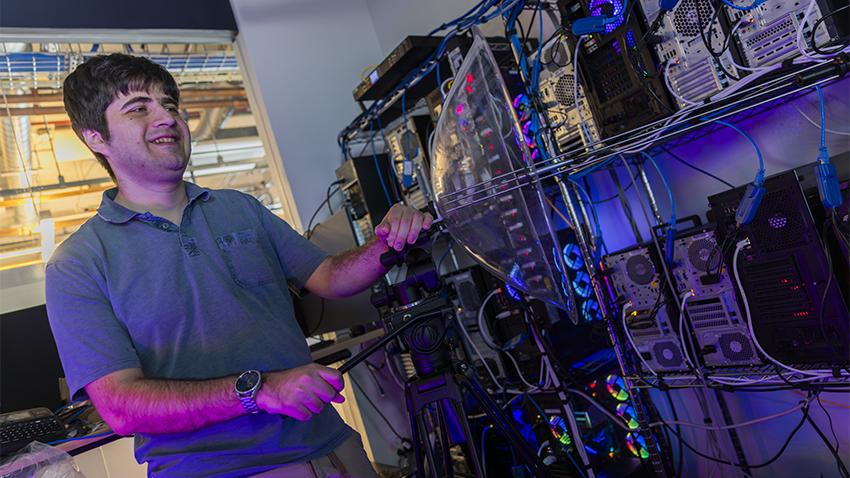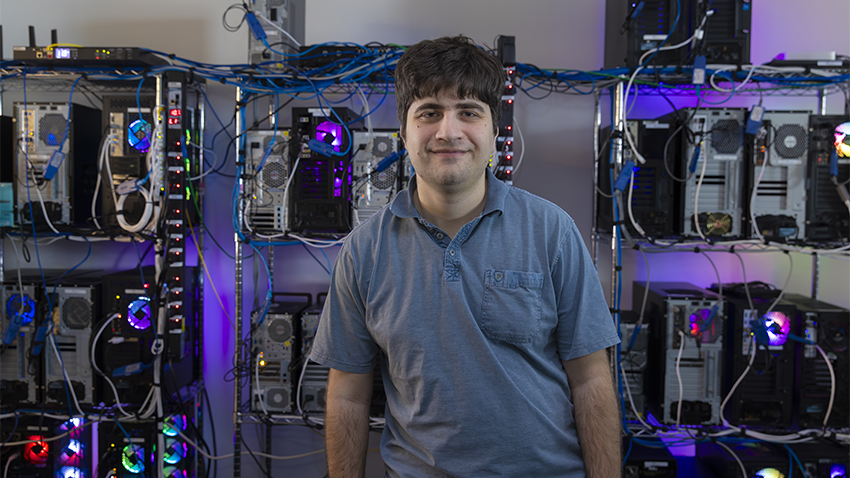
The Science of Breaking Things: Security Faculty Earns Prestigious Research Fellowship
In recognition of his groundbreaking hardware security research, Associate Professor Daniel Genkin has been awarded one of the highest honors available to early career faculty, a Sloan Research Fellowship
Genkin is working to close a 50-year gap in security engineering. Through his research, he has uncovered a new class of security vulnerabilities and created a new field in computer security. He has co-authored 59 papers with over 11,000 citations since 2016.
“Daniel is an outstanding early-career faculty whose work to date and trajectory unambiguously demonstrates potential,” said School of Cybersecurity and Privacy (SCP) Chair Michael Bailey. “While Daniel’s work is clearly rigorous and well regarded, I cannot emphasize enough how profound the intellectual impact of this work has been on recent research in hardware security.”
In 2018, Genkin and a team of researchers introduced Spectre and Meltdown, showing how features in the underlying hardware can undermine software security. By exploiting speculative and out-of-order execution features found in nearly all processors, the vulnerabilities violated the security of most isolation domains in modern software. Meltdown specifically affected processors made by Intel while Spectre’s impact was documented across nearly all processors and manufacturers.
These two new CPU vulnerabilities paved a new path in computer security. In the years since the discoveries, Genkin has been reexamining the relationship between software and hardware to address security problems for existing and future computing systems.
To do this, he works to understand how streamlining the design and operation of computer systems can fail in practice by using a variety of side-channel attacks he has developed over the years.

“With modern hardware consisting of billions of transistors, this is akin to finding the security needle in a performance haystack,” Genkin said. “We reverse engineer hardware complexities deliberately hidden by numerous abstraction layers, trying to understand how things work and their security implications.”
Based on his findings, Genkin designs attack countermeasures to secure existing hardware and modernizes security mechanisms to prevent future attacks.
Finally, he creates new methods for developing and designing computer systems. By aiming to achieve security in addition to performance, he seeks to close the decades-long gap in security engineering.
Genkin is one of four Georgia Tech faculty recognized as future academic leaders by the Alfred P. Sloan Foundation on Tuesday. He is the Institute’s first junior faculty in 10 years to receive this designation for work done in computer science. Since the award’s inception in 1955, Georgia Tech has had 55 Sloan Research Fellows, including the 2024 recipients.
“I would like to thank my students, collaborators, and mentors for helping me reach this far,” said Genkin. “Without truly wonderful colleagues, this journey would not have been possible.”
Genkin earned his Ph.D. from Technion (Israel Institute of Technology) where he was advised by Yuval Ishai and Eran Tromer. While at Technion, Genkin began experimenting with physical side-channel attacks and detected information leaking from a computer by recording the sound it made.
A self-described “tinkerer,” Genkin has also found system vulnerabilities using blinking lights, power consumption, acoustic noise, and even lasers.
He and his students spend their time tirelessly researching similar side-channel attacks in the SCP Hardware Security Lab and publish their work at top computing conferences worldwide. When he’s not in the lab breaking things, Genkin instructs the next generation of computer scientists in his course CS4235/6035: Introduction to Computer Security.


